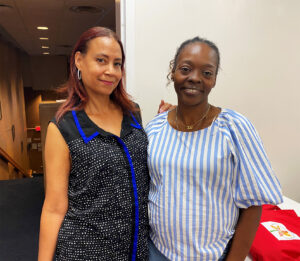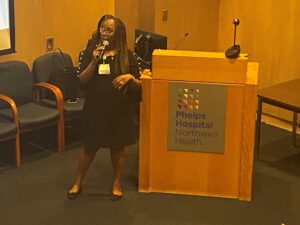
Sickle cell disease (SCD) is the overall name for a group of inherited red blood-cell disorders, including sickle cell anemia that disproportionately affects people of color and can create an array of serious health challenges, from infections to eye problems to strokes. (It is named for the crescent shape of the cells, which impede blood and oxygen flow throughout the body.)
Complicating the lifelong condition is the shortage of SCD doctors in the United States. A 2016 survey found that only 43% of commercially insured sickle cell patients and 7% of Medicaid patients saw a hematologist in the last year. Within Westchester County, there are few dedicated adult hematologists who treat adults with sickle cell disease.
Last October, Northwell Health welcomed Cheryl Mensah, M.D., a hematologist specializing in adult SCD, to Northern Westchester Hospital in Mount Kisco and Phelps Hospital in Sleepy Hollow as part of the Northwell Health Cancer Institute. (SCD is not cancerous, but as all hematologists are trained in malignant blood conditions such as leukemia and lymphoma, they generally work out of cancer centers.) It was fitting then that Phelps was the site of the inaugural World Sickle Cell Day June 12, when Mensah talked about new treatments for the disease:
“Gene therapy offers a new potentially curative treatment for sickle cell disease that involves chemotherapy but does not require a donor. It will offer benefits for patients who are eligible for bone marrow transplants but do not have a match. Outside of gene therapy, we are in a new era of multiple medications to reduce pain … In addition, there is research on new targeted therapies.”
Meanwhile, there are strategies to help people survive and thrive with sickle cell disease.
“I was told that I wouldn’t make it past a certain age,” said SCD sufferer Chantay Harrison-Crawford. “Thankfully, I met Dr. Mensah. The moment I walked into her office, she listened to me. She helped me meet my goals to lose weight and reduce stress … Sickle cell is just another disease like cancer. Doctors have to treat us with humanity and listen to these patients.”
Patients’ own advocacy is crucial to living with SCD as well, Harrison-Crawford added:


“When you are a sickle cell patient, you need to listen to yourself. We know our body best. When you are in pain, you know it and you must continue to advocate for yourself. Learn to listen to your body — what you can eat and what medicine you can and don’t want to take.”
For more, visit northwell.edu.





















